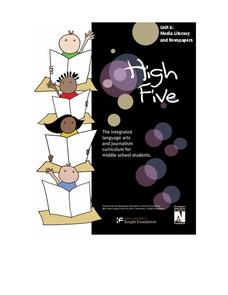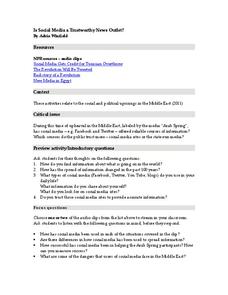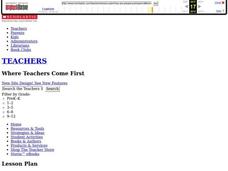Curated OER
Media Babies
What is a media baby? Discuss at what age children should be exposed to electronic media. After reading an article, they identify the types of media products for infants and toddlers. Learners will predict the effects of media on the...
Curated OER
Diversity in Media: Looking Critically at What We See
This learning experience fosters awareness of representations we see, and don't see, in the media. Learners list TV programs, games, and films they enjoy, identify characters' ethnic, religious, (dis)ability, and sexual orientation...
English Enhanced Scope and Sequence
Research Project Embedded with Media Literacy
Here is a phenomenal language arts lesson on media literacy for your middle and high schoolers. In it, learners produce a research product in the form of a public service announcement (PSA). First, they view examples of these PSA's to...
Curated OER
Nutrition and the Media: Cereal Box Consumerism
How many treats do you buy each week? Learners investigate diets and how the media tricks consumers into purchasing unhealthy snacks. They will investigate the designs and logos affiliated with cereal boxes and identify specific phrases...
Rockefeller Archive Center
Understanding Mass Media News
In an age of fake news and photoshopped images, it is vital that 21st century learners development the skills they need to evaluate mass media and assess its validity. A great way to launch such a study is with a carefully crafted lesson...
Curated OER
Bias and Crime in Media
Critical thinking and social justice are central themes for this resource on bias and crime in media. The class views and discusses an incisive PSA that highlights assumptions based on race. Small groups read newspaper opinion pieces...
Curated OER
Find The Hidden Message: Media Literacy in Primary Grades
Learners practice listening to and reading various types of media and text. In groups, learners use video, newspapers, magazines, and more to compare and contrast different types of information. They identify the differences between fact...
American Press Institute
Media Literacy: Where News Comes From
What actually happens at a press conference? Make sense of the mayhem with a mock press conference activity designed to promote media literacy. Individuals participate as either members of the press or the governor's office to examine...
Curated OER
Understanding the Influence of the Media
Critically analyze advertising techniques, such as circular reasoning, bandwagon, testimonial, and repetition, with worksheets that effectively discuss and illustrate how the media aims to influence.
Student Handouts
Social Media Madness
Tired of seeing u instead of you and 2 instead of too? Teach your pupils how to write for an academic setting by asking them to correct these six social media posts that are full of grammatical errors, spelling errors, and text speak.
Curated OER
Fighting Fake News
Fake news. Alternative facts. Internet trolls. In an age of Newspeak, it's increasingly important to equip 21st century learners with the skills needed to determine the legitimacy of claims put forth on social media, in print, and in...
PBS
How to Teach Your Students about Fake News
What media literacy skills do people need to evaluate a news source? Scholars listen to and discuss an NPR story about how fake headlines often dupe young people and adults alike. Next, they study news stories, using a fact-checking...
Media Smarts
Facing TV Violence: Consequences and Media Violence
Make your class aware of the difference between media violence and real violence. Using prior knowledge, a video clip, and a worksheet, class members explore and discuss the unrealistic portrayal of violence in the media. Learners...
Media Smarts
Bias in News Sources
As young consumers of media, it is important for high schoolers to explore concepts of bias and prejudice, and how they may be present in media. After discussing ideological messages that media can contain, individuals complete a warm-up...
American Press Institute
High Five: Media Literacy and Newspapers
Teach the five different types of media with the first of three in a media literacy unit. Learners create and propose a final newspaper project, which must address information covered throughout the unit.
Ontario
Critical Literacy—Media Texts
Media texts convey both overt and implied messages. As part of their study of media, class members analyze the language, form, techniques, and aesthetics in a variety of media texts.
Southern Poverty Law Center
Analyzing Gender Stereotypes in Media
Why might toy advertisers use gender stereotypes to sell their products? Young people think critically about media messages and its role in gender stereotyping with a thought-provoking lesson.
ProCon
Social Media
Facebook, Instagram, Twitter—are they good for society? Pupils prepare for a class debate in which they voice their opinions on the issue. They read the main pro and con arguments, explore others' opinions, view videos, and discover the...
ReadWriteThink
Critical Media Literacy: Commercial Advertising
Commercial advertising—we can't get away from it, but do we realize just how often we are being advertised to? With this lesson, scholars analyze mass media to identify how its techniques influence our daily lives. Learners browse...
Curated OER
How the Media Uses Polling Data in Presidential Election Coverage
Students research and analyze polling data in journalism. They discuss reasons that polling data is included in media coverage of presidential elections.
Curated OER
Through Many Lenses: How are Countries Depicted by the Media?
If you plan to utilize the ABC miniseries, "The Path to 9/11" in your classroom, consider incorporating media literacy and research skills. After (or while) learners view the series, they discuss ways information can differ from source...
Curated OER
Is Social Media a Trustworthy News Outlet?
Examine the role of social media in social and political uprisings. Pupils listen to NPR audio clips about social media and the Arab Spring and read an article that proposes the idea that revolution will not happen through social media....
Curated OER
How are People Portrayed by Different Media?
Your 9th - 12th graders can hone their analysis and critical thinking skills by studying the way a subject is portrayed across media types. They examine how various print, visual, and online sources have portrayed key players in the 9/11...
Anti-Defamation League
On-Screen Diversity: Why Visibility in Media Matters
Characters play a significant role in why we like certain shows and movies but are the characters we watch representing the diverse society in which we live? Scholars examine this question through thoughtful discussion about popular...

























